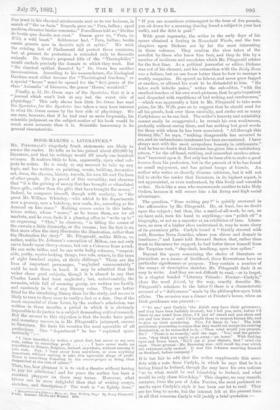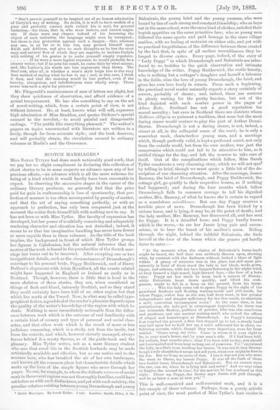BOOK-MAKING v. LITERATURE.*
MR. FITZGERALD'S singularly frank statements are likely to amuse the reader. He tells us he has gained about £20,000 by
literature, and that his writings would fill nearly one hundred volumes. It matters little to him, apparently, upon what sub- jects he writes. He is ready at any moment to take up any topic, and has written on painting, music, building, decorative art, dress, the classics, history, travels, his own life and the lives of other people. He is proud of this versatility, and observes that "it is the gaining of money that has brought or stimulated these gifts, rather than the gifts that have brought the money." Indeed, he compares himself, though with modesty, to "the great Mr. William Whiteley,—who added to his departments now a grocery, now a butchery, now coals, &c., according as the demand on him came." Nothing comes amiss to this indus- trious writer, whose "wares," as he terms them, are for all markets, and he even finds it a pleasing office to "write up to" an engraving. " This," he observes, "is lifting the corner of the curtain a little discreetly, or the reverse; but the fact is so, that more often the story illustrates the illustration, rather than the illustration the story." Mr. Fitzgerald, unlike Milton, or, rather, unlike Dr. Johnson's conception of Milton, can not only carve heads upon cherry-stones, but cut a Colossus from a rock. He can write trifles, and he can write bulky volumes, "respect- able, portly, squire-looking things, two vols. octavo, to the tune of eight hundred copies, at thirty shillings." These are the lives of important personages, "neglected unaccountably" until he took them in hand. It may be admitted that the writer chose good subjects, though it is absurd to say that Charles Lamb had been neglected ; but, unfortunately, the memoirs, while full of amusing gossip, are written too hastily and carelessly to be of any literary value. They are better fitted for the circulating library than for the study, and no one is likely to turn to them even to verify a fact or a date. One of the most successful of these Lives, by the author's admission, was written in three months, a period in which it is obviously impossible to do justice to a subject demanding critical research. But the answer to this objection is that the books have paid; and monetary success is, in Mr. Fitzgerald's judgment, success in literature. He finds his vocation the most agreeable of all professions. One " department " he has " exploited syste- matically" ;—
" I have travelled, be writes, a great deal, but never at my own cost, rather to exceeding profit I have never made an expedition to Prance, Belgium, Ireland, anywhere, without turning it into cash. Nay, I have never been anywhere, or seen anything important, without making it take this agreeable shape of profit. There is something flattering to the amour-propre in being thus despatched at the cost of others." Then, too, how pleasant it is to visit a theatre without having to pay for admission ! and for years the author has been a constant playgoer on these easy terms. Moreover, what labour can be more delightful than that of writing essays, sketches, and descriptions ? The Work is "so lightly done." * Recreations of a Literary May ; 2 vols. London : Chutto and Windou's. D;312.writiny Pay ? By Percy Fitzgerald.
"If you are sometimes extravagant to the tune of five pounds, you sit down for a morning (having found a subject in your last walk), and the debt is paid."
With great ingenuity, the writer in the early days of his career obtained a footing in Household Words, and the two chapters upon Dickens are by far the most interesting in these volumes. They confirm the view taken of the novelist by those who know him best, and they do this by a 'number of incidents and anecdotes which Mr. Fitzgerald relates for the first time. As a political journalist or editor, Dickens.
was out of his element, and his connection with the Daily News was a failure, but no one knew better than he how to manage a weekly magazine. He spared no labour, and never grew fagged or careless, or allowed his work to be distasteful to him. "He takes such infinite pains," writes the sub-editor, "with the smallest touches of his own word-pictures, that he gets impatient, and disgusted with repetitions of bad writing and carelessness,' —which was apparently a hint to Mr. Fitzgerald to take more pains, for Mr. Wills goes on to suggest that be should send for all his proofs, look over them carefully, and strike out as many Carlyleisms as he can find. The writer's honesty and amiability cannot easily be exaggerated; he reveals his own weaknesses, probably without seeing them, and has nothing but good words for those with whom he has been associated. "All through this literary life," he says, "nothing disagreeable has occurred to me, and no unhandsome treatment has been encountered. I have always met with the most scrupulous honesty in settlements." And he has no doubt that literature has given him a satisfactory return, "for the off-hand, rattling, and somewhat careless atten- tion" bestowed upon it. Not only has he been able to make a good income from his profession, but in the pursuit of it he has found no small enjoyment, and has gained troops of friends. An author who writes so cheerily disarms criticism, but it will not fail to strike the reader that literature, in its highest aspect, is not appreciated, or even understood, by this lively and versatile writer. He is like a man who recommends another to take Holy Orders, because it will secure him a fat living and high social advantages.
The question, "Does writing pay P" is quickly answered in the affirmative by Mr. Fitzgerald. He, at least, has no doubt upon the subject ; but then, like a maid-of-all-work, he can, as we have said, turn his hand to anything,—can "polish off" biography, or act as a reporter at an exhibition of fans. Litera- ture, as men of a higher class understand it, may be more chary of its pecuniary gifts. Carlyle found it "thickly strewed with cold, Russian Nova Zemblas, where you shiver and despair in loneliness ;" and Lamb told Bernard Barton that, rather than trust to literature for support, he had better throw himself from the Tarpeiau rock, "slap-dash, headlong, upon iron spikes."
Beyond the query concerning the choice of literature or journalism as a means of livelihood, these Recreations have no
particular significance or purpose. They contain a number of the essays or descriptive sketches Mr. Fitzgerald finds it so easy to write. And they are not difficult to read,—or to forget. In a chapter headed "Literary Friends : Forster—Carlyle," (does the word friend, by the way, exactly describe Mr.
Fitzgerald's relations to the latter ?) there is a characteristic. account of a " deliverance " made by the philosopher upon Irish affairs. The occasion was a dinner at Forster's house, when an Irish gentleman was present :—
" Ye see,' said Carlyle, 'the Airish may have their grievances, and they have been hairshly treated; but I tell you, sairs, before I'd listen to one weird from them, I'd just wi' sword and gun shoot and cut and how them a' until I'd taught them to respect human life, and to give up their murdering. Then I'd listen to 'em.' The Irish gentleman proceeding to argue that they would not accept the existing
domination, or be reconciled to Then what would you propose, Sir P" There is no remedy,' said the sage. Yes,' said the gentle- man, they think you ought to go away,—go home.' With flashing eyes and fierce burst, We'll cut a' your throats, first !' erred the sage. Those present—Mr. Browning was—will recall the roar which the vehement sally evoked. It was like Johnson assailing Boswell on Scotland, before company."
It is but fair to add that the writer supplements this anec- dote with a note from Carlyle, in which he says that he is a loving friend to Ireland, though ihe may have his own notions "as to what would be real friendship to Ireland, and what would be only sham friendship." This chapter, we may remark, contains, from the pen of John Forster, the most pertinent re- marks upon Carlyle's style it has been our lot to read. They are too long to quote, but the interest felt at the present time in all that concerns Carlyle will justify a brief quotation :—
"Don't permit yourself to be laughed out of an honest admiration of Carlyle's way of writing. No doubt, it is well to have models of a pure and perfectly correct style (which his is not), for general imitation,—for those, that is, who must imitate, and cannot origin- ate. If there were any chance indeed of his becoming the object of such imitation, the language might soon be corrupted ; but there is this protection against such a danger,—that, whereas any ono, in as far as in him lies, may ground himself upon Swift and Addison, and give to such thoughts as he has the most -easy and natural flow of which they are capable, to imitate Carlyle with nothing of his genius is to make yourself simply repulsive.
If be were a more logical reasoner, he would probably be a .clearer writer; but if he gets his result, he cares little by what means; and, like Luther's, his words are less arguments than blows. The ffinal test, after all, is whether a man's style helps him to the very best method of saying what he has to say ; and, in this case, I think it does, and that the meaning would be less perfect, even if the +brevity, abruptness, and indefiniteness were wholly away. There mover was such a style for pictures."
Mr. Fitzgerald's reminiscences of men of letters are slight, but they show quickness of observation, and afford evidence of a genial temperament. He has also something to say on the art -of novel-writing, which, from a certain point of view, is not without interest. He, at least, knows what will sell, expresses high admiration of Miss Braddon, and quotes Dickens's special counsel to the novelist,—to avoid painful and disagreeable ,endings. "The public like everything pleasant." The author's papers on topics unconnected with literature are written in a 'lively, though far from accurate style ; and the book deserves, .and will probably obtain, the circulation secured to ordinary volumes at Mudie's and the Grosvenor.



































 Previous page
Previous page